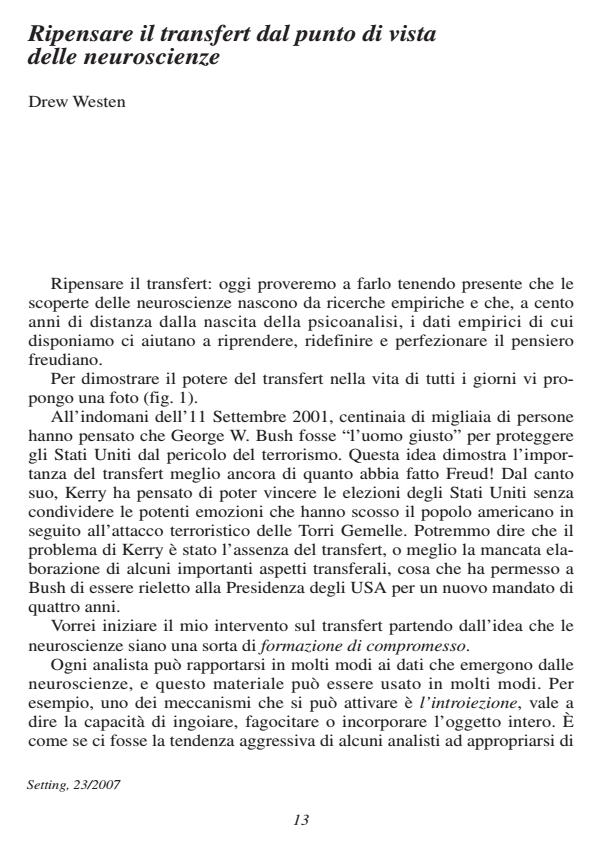Ripensare il transfert dal punto di vista delle neuroscienze
Journal title SETTING
Author/s Drew Westen
Publishing Year 2008 Issue 2007/23
Language Italian Pages 24 P. 13-36 File size 502 KB
DOI
DOI is like a bar code for intellectual property: to have more infomation
click here
Below, you can see the article first page
If you want to buy this article in PDF format, you can do it, following the instructions to buy download credits

FrancoAngeli is member of Publishers International Linking Association, Inc (PILA), a not-for-profit association which run the CrossRef service enabling links to and from online scholarly content.
This paper, presented in June 2006 at the meeting Was Freud right? (1856- 2006), points out Drew Westen’s concept of the psychoanalytical transference as a set of patterns (thoughts, feelings, motivations, affective regulations and behaviours) emerging in the therapeutic relationship. It would reflect some definite features of the patient’s personality and interpersonal functioning more than the therapist’s ones. Why that kind of transference emerges in that just moment in that just treatment? Which the linking between past and now and here events? Westen’s answers root from the observation of brain processes by neuroimaging, that showed how thtransference in a definite phase of the analytical treatment reflects the confluence of neural associative networks activated in that phase and that two matching transference processes develop from them, the first leading to a cognitive activation of the past and the second to its edonic activation or inhibition. So, Westen can demonstrate his hypothesis of the transference as a form of compromise formation, cooperation or competition between cognitive and edonic activations. Every time the therapist refers to or thinks of her/his patient, the activation of these associative networks increases and lets the therapist understand even what the patient did not say verbally or explicitly. The article illustates also an interesting study about conflicts and defences of people standing for different political parties during the last (2004) presidential elections in the United States and its implications for the concept of transference as an activation of potentials based on the patient’s history and psychodynamics, Ripensare il transfert dal punto di vista delle neuroscienze shaped by the influence of the neural networks activated in a given time by various factors, among which the specific patterns of the therapeutic relationship and the therapist’s own characteristics.
Drew Westen, Ripensare il transfert dal punto di vista delle neuroscienze in "SETTING" 23/2007, pp 13-36, DOI: